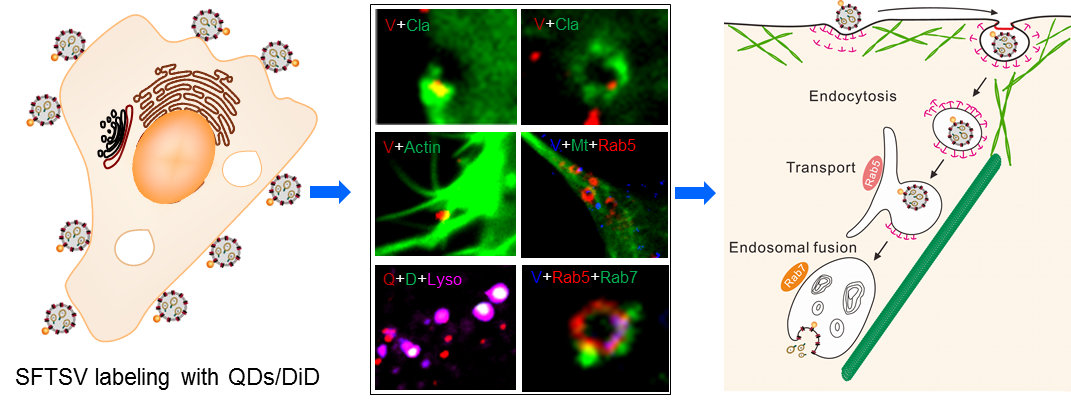The Bunyavirales is one of the largest groups of RNA viruses, which encompasses more than 350 members distributed among nine families. Severe fever with thrombocytopenia syndrome virus (SFTSV), an emerging bunyavirus in the genus Phlebovirus, was first identified in China in 2009, with a high case fatality rate of up to 30%.
Although some critical entry steps have been investigated, a comprehensive picture of the bunyavirus entry process remains to be depicted. There is an urgent need for developing effective approaches for unraveling dynamic entry process of bunyaviruses.
In a joint study, the research groups from Huazhong University of Science and Technology and Wuhan Institute of Virology of the Chinese Academy of Sciences dissected the dynamic molecular process of SFTSV entry and penetration via quantum dot (QD)‐based single‐particle tracking and multicolor imaging.
The researchers showed that SFTSV is internalized into the host cell via the recruitment of clathrin onto the plasma membrane for clathrin‐coated pit formation. Then the virus‐containing clathrin‐coated vesicles deliver SFTSV particles and membranes to Rab5+ EEs, and further to Rab7+ LEs, a common mechanism of cytoplasmic delivery also shared by other bunyaviruses, such as Uukunniemi virus, the Rift Valley fever virus and Crimean‐Congo hemorrhagic fever virus (CCHFV).
The intracellular trafficking of SFTSV is dependent on the two different kinds of cytoskeleton in sequence: first on actin filaments at the cell periphery, subsequently switching to microtubules toward the cell interior.
It has been demonstrated that cytoskeletons are also involved in hantavirus and CCHFV entry, suggesting that cytoskeleton might be generally involved in bunyavirus transport. For the vast majority of virions, acid‐activated penetration was triggered at pH5.6 in LEs.
This study enriches the understanding of the entry mechanisms of bunyaviruses, and provides potential targets for SFTS prevention and control.
The results have been published in small entitled "Single-Particle Tracking Reveals the Sequential Entry Process of the Bunyavirus Severe Fever with Thrombocytopenia Syndrome Virus".
This work was supported by grants from the National Natural Science Foundation of China, the Fundamental Research Funds for the Central Universities, HUST, and Open Research Fund Program of the State Key Laboratory of Virology of China, the Science and Technology Basic Work Program and the National Science and Technology Major Project of China.
 Entry model of SFTSV into host cells. (Image by WANG Manli)
Entry model of SFTSV into host cells. (Image by WANG Manli)




